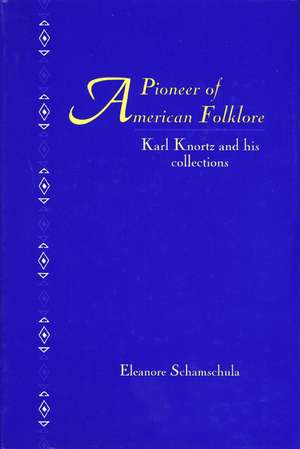A Pioneers of American Folklore: Karl Knortz and His Collections: Northwest Folklife
Autor Eleonore Schamschula, Eleanore Schamschulaen Limba Engleză Hardback – 31 dec 1995
Distributed by the University of Nebraska Press for the University of Idaho Press
Schamschula has sought to include primarily materials which came from the American oral tradition. She has grouped Knortz's collected data conveniently into listings by genre and provided the first comprehensive bibliography of his scholarly works.
Preț: 232.49 lei
Nou
Puncte Express: 349
Preț estimativ în valută:
44.49€ • 46.54$ • 36.96£
44.49€ • 46.54$ • 36.96£
Carte indisponibilă temporar
Doresc să fiu notificat când acest titlu va fi disponibil:
Se trimite...
Preluare comenzi: 021 569.72.76
Specificații
ISBN-13: 9780893011857
ISBN-10: 0893011851
Pagini: 326
Ilustrații: index
Dimensiuni: 159 x 236 x 26 mm
Greutate: 0.63 kg
Ediția:New.
Editura: Caxton Press
Seria Northwest Folklife
ISBN-10: 0893011851
Pagini: 326
Ilustrații: index
Dimensiuni: 159 x 236 x 26 mm
Greutate: 0.63 kg
Ediția:New.
Editura: Caxton Press
Seria Northwest Folklife
Recenzii
"Knortz was a German American folklorist who, beginning in the 1870s, systematically collected data and published many works on American folklore?but mostly in German to edify the people of his native land concerning the customs and culture of the United States. Schamschula, an independent scholar originally from Germany, has fused a biography of Knortz (factual and impersonal) with a discussion (some-what repetitive) of how Knortz's methods and theories agreed or disagreed with those of the leading folklorists of his time. The extensive final section of her work includes substantial portions of material collected by Knortz from the oral tradition: superstitions ("If you forget what you say, it was a lie"), dream interpretations ("A dream of onions brings good luck"), legends, cures, songs, rhymes, riddles, proverbs, tongue twisters, games, customs, folk similes, sayings, and slang. The work is scholarly and will be of interest primarily to folklorists. Nonetheless, it is fascinating to see which folk customs have survived from the last century to this, intact or altered to fit a new age."—Library Journal

